Let’s be honest – who hasn’t daydreamed about escaping Britain’s unpredictable weather for a life of Mediterranean sunshine? Greek islands are increasingly becoming the go-to choice for Brits looking to make this dream a reality, and it’s not hard to see why. They offer something special for year-round living: mild winters, over 300 days of sunshine annually, and living costs that won’t break the bank.
You’ll be pleased to hear that in the 2023 Expat Insider survey by InterNations, Greece was recognised as a country where settling and finding friends among locals is easy, which makes the transition to island life much smoother for newcomers. Part of this is down to its numerous visa options.
In 2021, Greece joined the growing number of countries embracing remote work by launching its Digital Nomad Visa, and since then, remote workers and their families have been flocking to the islands. The visa allows non-EU/EEA remote workers to live in Greece for up to 12 months while working for companies or clients outside the country, requiring proof of stable remote income of at least €3,500 per month after taxes.
But here’s the thing – not all Greek islands are suitable for permanent living. Many of the smaller, more touristy spots essentially shut down during the off-season, with restaurants closing, ferry services reduced, and even basic amenities becoming scarce from November through March.
That’s exactly why we’ve been selective about our recommendations. The four islands we’ve chosen are specifically picked because they maintain active, functioning communities year-round. You won’t find yourself stranded with nowhere to grab groceries or get a decent meal in January. These islands have substantial local populations, not just seasonal tourism, which means shops stay open, public transport continues running, and you’ll have neighbours who actually live there full-time.
Crete: The Island That Has Everything
Crete is Greece’s largest island and honestly, it’s got the lot. Whether you want bustling city life or peaceful countryside, this island delivers. Heraklion is becoming a proper tech hub with a growing startup scene, boasting a well-educated workforce and supportive ecosystem for entrepreneurs.
The city’s robust infrastructure makes it perfect for technology companies, while Chania, with its UNESCO-listed Venetian harbour, attracts a sophisticated international crowd. If you’re after peace and quiet, the largely undeveloped south coast offers countless options for tranquil living.
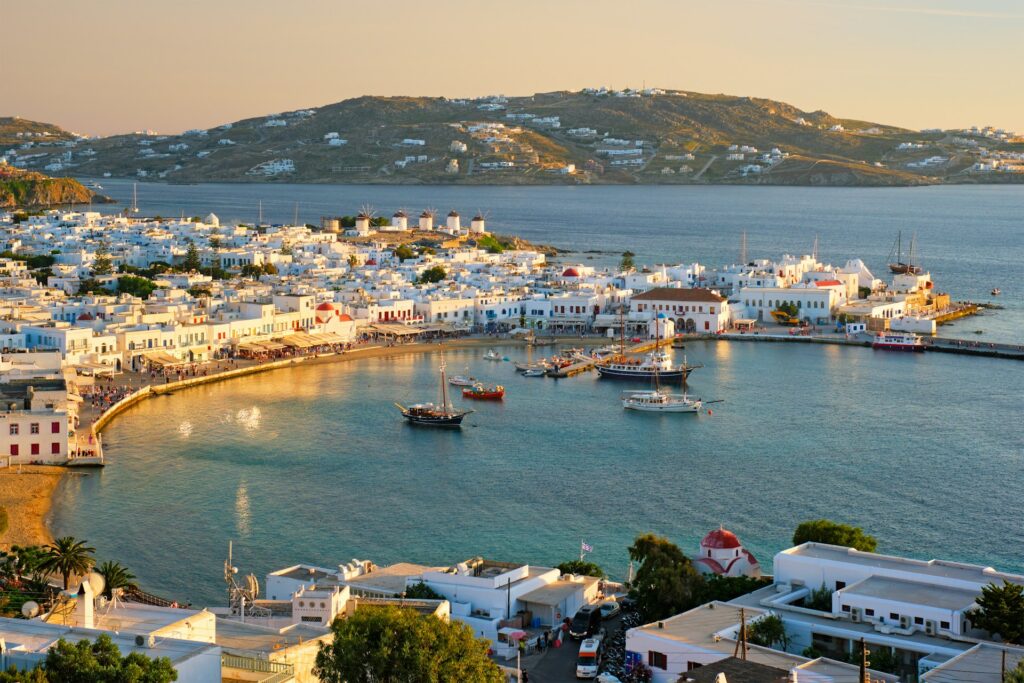
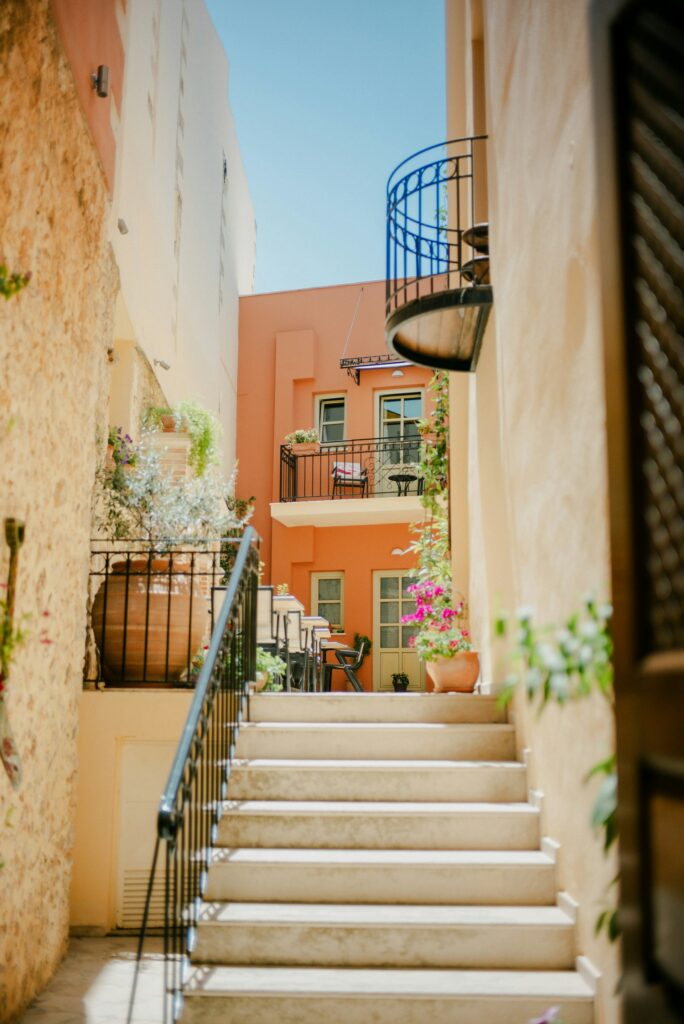
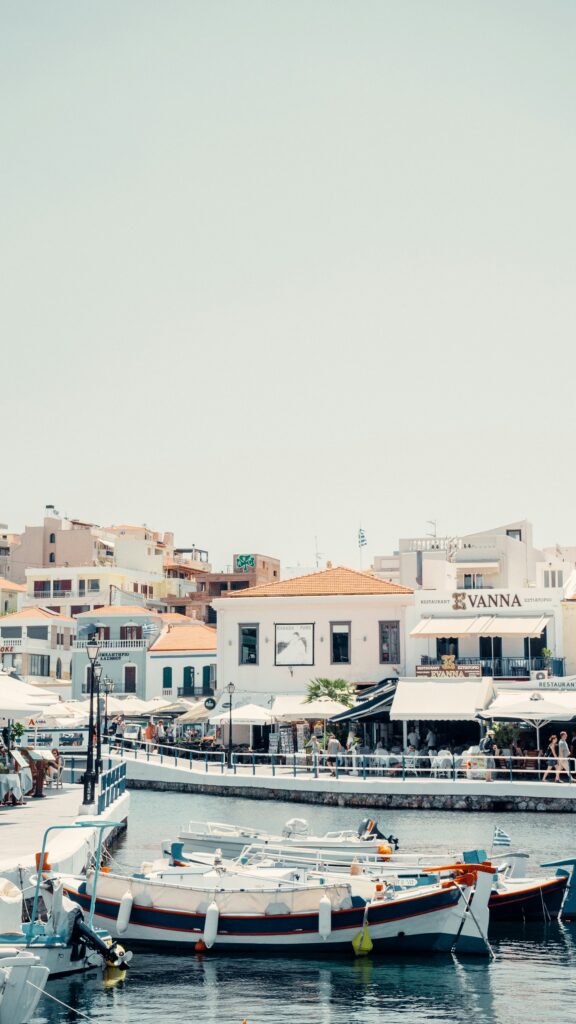
Ideal for the cosmopolitan adventurer: Those who want options. City amenities when you need them, unspoiled countryside when you don’t. This island suits professionals, families, and retirees who appreciate diversity in their living environment and want access to sophisticated cultural attractions while maintaining the option to retreat to secluded beaches or mountain villages.
What’s it like living there? Crete enjoys one of Europe’s best climates – over 300 days of sunshine and winters that rarely drop below 10°C, making it genuinely suitable for year-round residence. The island’s diverse geography means you can find everything from vibrant beach communities to peaceful mountain villages, each offering its own unique character and lifestyle.
The internet infrastructure is excellent throughout most areas, with high-speed broadband suitable for remote work now standard. There’s even a co-working space called Workhub right in the heart of Heraklion, perfectly positioned near beaches, pharmacies, supermarkets, and transport networks for that classic Greek island co-working experience.
Where you’ll live: Housing options range from traditional stone villas with private pools in areas like Chania and Rethymno (€1,000-€3,000 monthly) to modern town center apartments (€400-€800 monthly) and budget-friendly rural properties from €300 monthly. Most properties come fully furnished with reliable WiFi, air conditioning, and modern amenities, with established expat communities creating a robust long-term rental market designed for permanent residents rather than tourists.
Read: 48 Hours In The Crete Capital, Heraklion
Corfu: Green, Gorgeous, and Sophisticated
Corfu is different from the typical Greek island – it’s lush and green thanks to more rainfall, with a unique blend of British, French, and Venetian influences. The UNESCO-listed Old Town is absolutely stunning, and there’s a reason Brits have been drawn here since the British Protectorate period from 1815 to 1864. This historical connection continues today, creating a welcoming environment for UK residents.
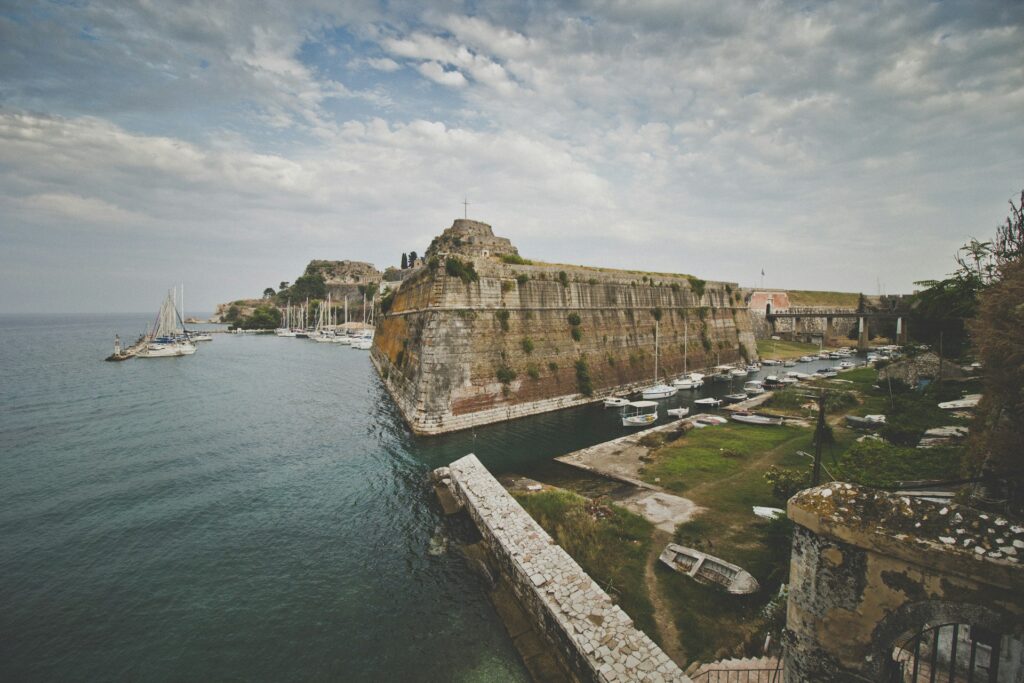
The island has embraced digital nomads in innovative ways. A local startup has created an AI-powered platform that matches remote workers with suitable long-term rentals based on their work requirements and lifestyle preferences. The main coworking space in Corfu Town features a rooftop solar farm that powers its high-speed internet infrastructure, while the municipality offers a “Digital Nomad Welcome Package” including a free 30-day public transportation pass and discounts on local attractions.
Ideal for the cultured traditionalist: Culture lovers and anyone missing British greenery. Corfu appeals to those who appreciate European sophistication mixed with Greek warmth, perfect for history enthusiasts and anyone seeking a more temperate climate with lush, green surroundings. The island suits those who value architectural beauty and a slower, more refined pace of life.
What’s it like living there? Corfu’s unique position in the Ionian Sea gives it a distinctly different character from Aegean islands, with lush green landscapes that remain verdant even in summer. More temperate than other Greek islands, this makes it particularly appealing to those missing the greenery of Britain. The compact size means you’re never far from both mountains and sea, while the rich history is evident everywhere, from the Old Town’s arcaded Liston to the magnificent palaces of Achilleion.
The local culture seamlessly blends Greek traditions with Italian and British influences, creating a unique cosmopolitan atmosphere that feels both familiar and exotic to British residents.
Where you’ll live: Accommodation ranges from traditional villas in olive groves (€250-€600 monthly) to historic properties within Corfu Town’s converted Venetian mansions (from €500 monthly) and seafront apartments in areas like Glyfa and Almyrida (€400-€1,200 monthly). The island’s compact geography means even rural properties are rarely more than 30 minutes from main amenities, with many rentals featuring traditional Ionian architecture, private terraces, gardens, and pools.
Rhodes: Medieval Magic Meets Modern Life
Rhodes perfectly balances historical significance with modern convenience, offering perhaps the best combination of living surrounded by tangible history while enjoying contemporary amenities. The island’s strategic position in the Dodecanese has made it a crossroads of civilizations for millennia, creating a rich tapestry of cultural influences that’s both cosmopolitan and traditional, timeless yet thoroughly modern.
The medieval Old Town, a UNESCO World Heritage site, provides a stunning backdrop for daily life that never gets old. Meanwhile, the modern areas offer all necessary amenities, excellent infrastructure for digital nomads to thrive, and a growing community of remote workers drawn by reliable internet and dedicated coworking spaces.
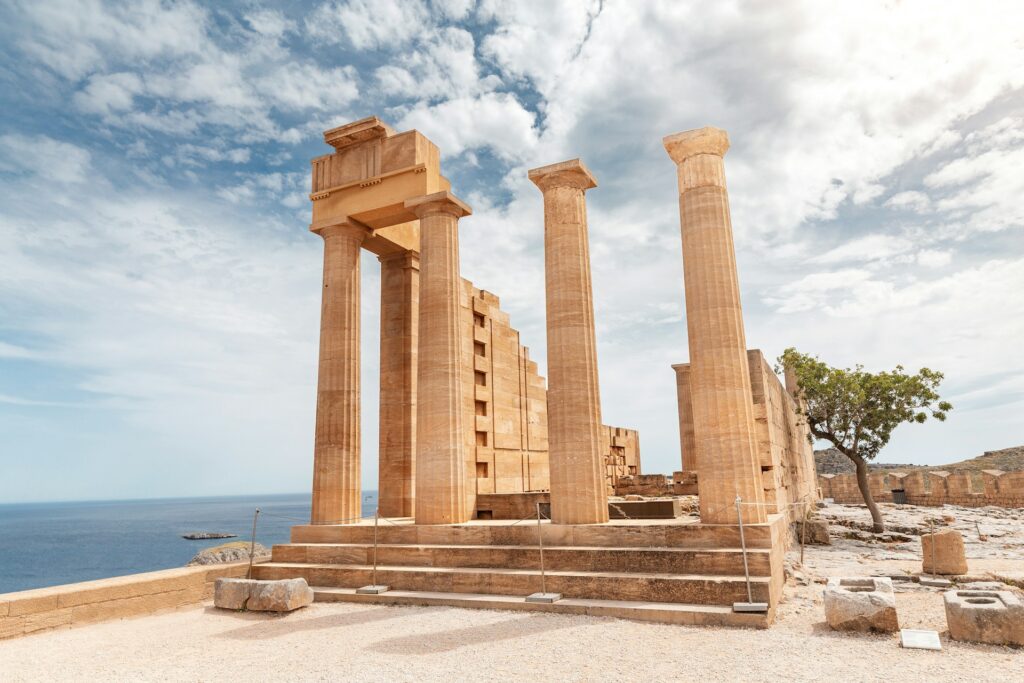
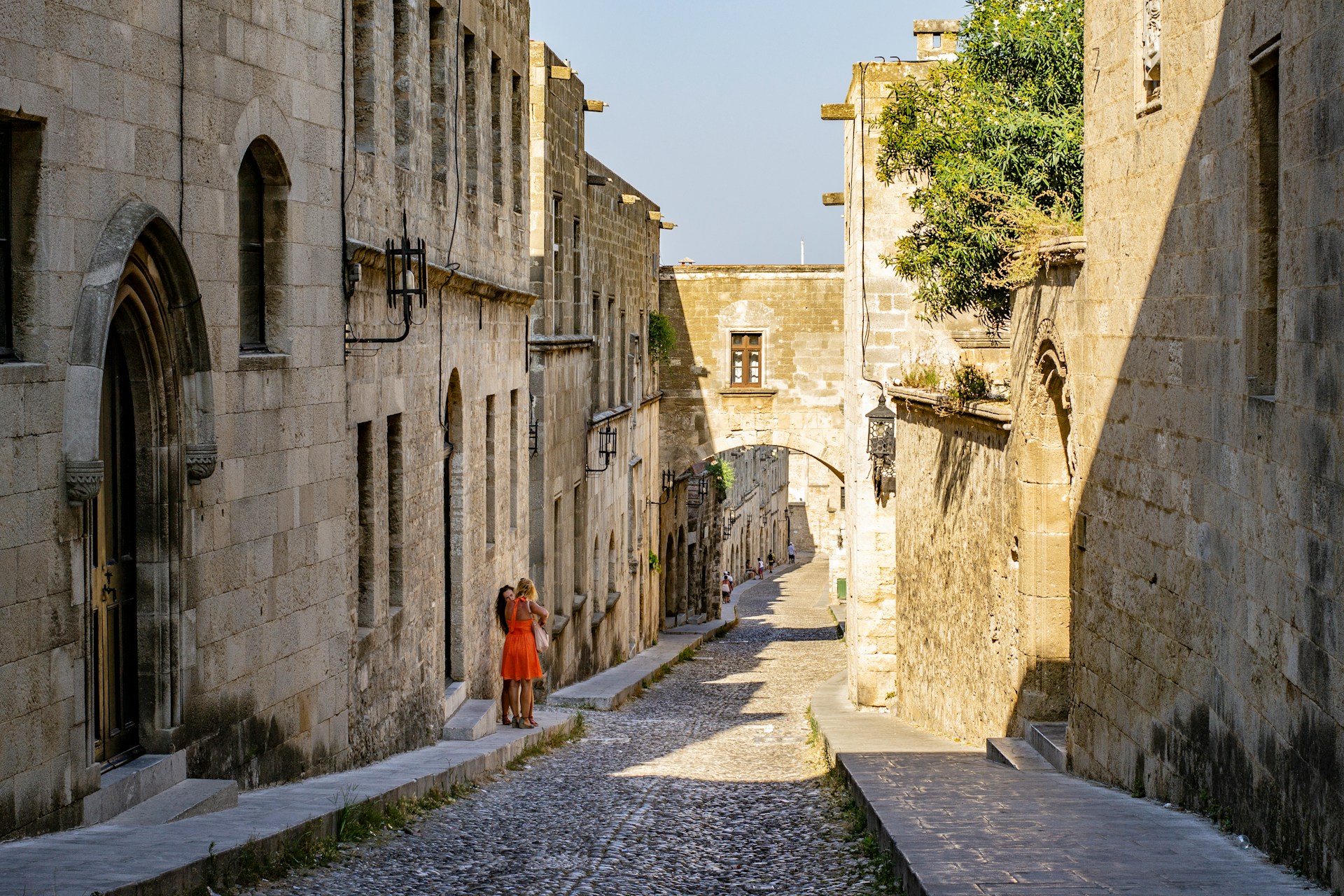
Ideal for the active history enthusiast: Those who want to live surrounded by tangible history while enjoying modern conveniences. Rhodes suits active individuals who appreciate both cultural exploration and outdoor activities, from beach sports to hiking in pine-forested mountains. The island particularly appeals to digital nomads, young professionals, and anyone seeking a vibrant social scene within a historically significant setting.
Read: The Best Restaurants In Rhodes, Greece
What’s it like living there? Rhodes enjoys over 300 days of sunshine annually and benefits from the meltemi winds in summer, which provide natural air conditioning during the hottest months. The island’s diverse landscape includes everything from ancient ruins and pristine beaches to pine-forested mountains, offering endless opportunities for exploration and outdoor activities.
The tourism industry provides a robust local economy that supports year-round residents, while significant investment in digital infrastructure has made it increasingly attractive to remote workers and digital entrepreneurs. The well-developed tourism infrastructure translates into high-quality services and reliable utilities year-round.
Where you’ll live: Accommodation ranges from traditional villas in olive groves (€250-€600 monthly) to historic properties within Corfu Town’s converted Venetian mansions (from €500 monthly) and seafront apartments in areas like Glyfa and Almyrida (€400-€1,200 monthly). The island’s compact geography means even rural properties are rarely more than 30 minutes from main amenities, with many rentals featuring traditional Ionian architecture, private terraces, gardens, and pools.
Lesvos: Real Greece Without the Crowds
Lesvos, also known as Lesbos, is where you’ll find authentic Greek island living without the tourist hordes. As Greece’s third-largest island, there’s plenty of space to breathe and really become part of the local community. This remarkable island boasts castles, noble mansions, olive groves, and countless beaches, and is famous as the birthplace of both ancient poet Sappho and ouzo.
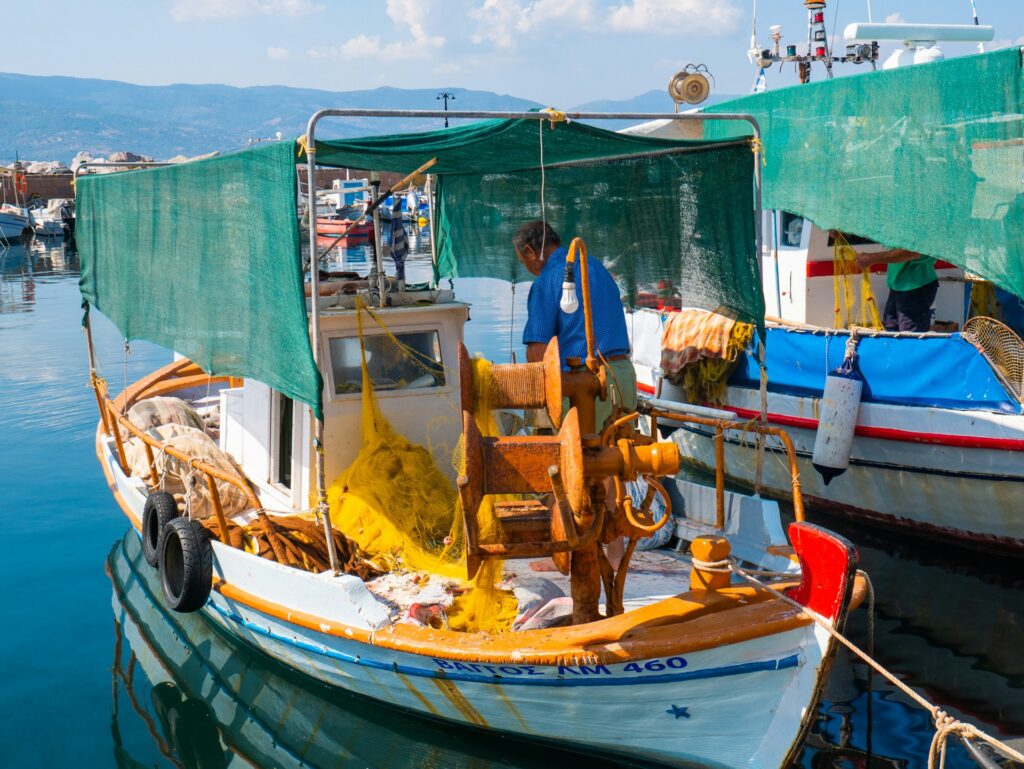
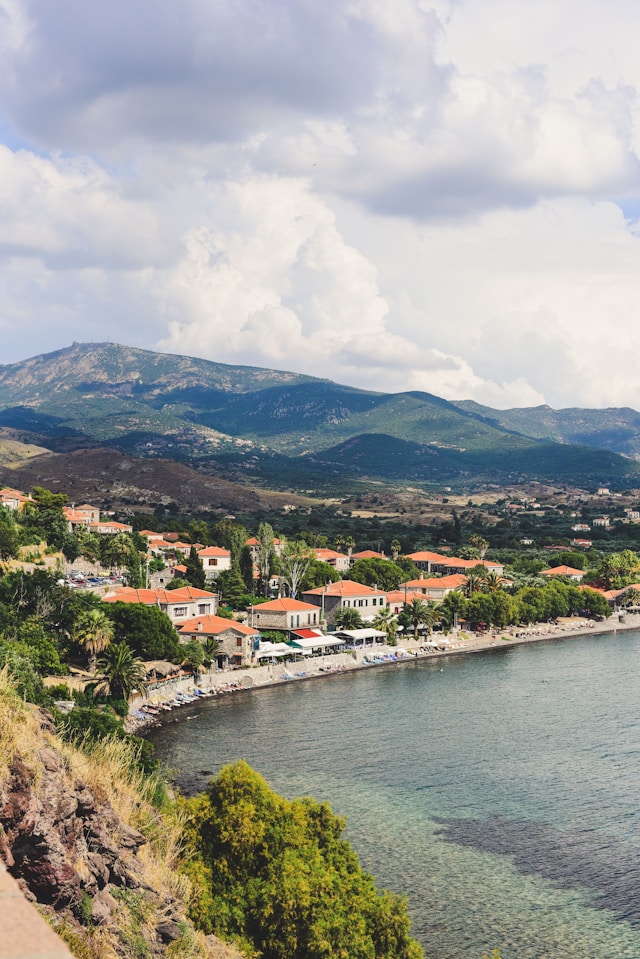

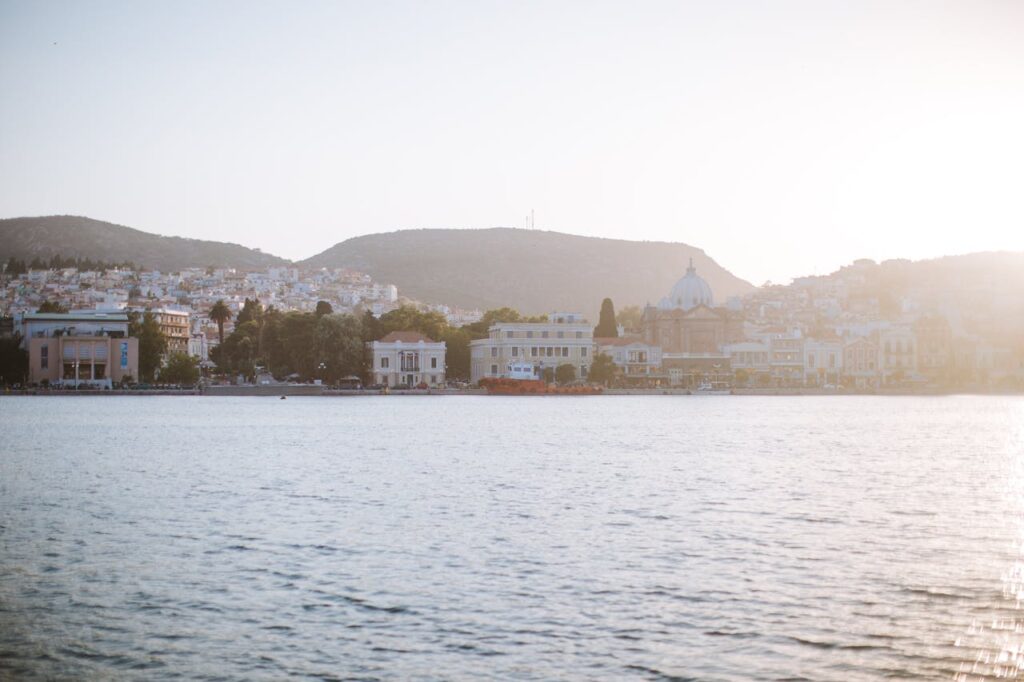
The island is renowned for its cultural heritage and continues to attract artists and writers today, drawn by its authentic atmosphere and creative community. Its thermal springs, petrified forest, and traditional architecture provide a unique living environment that feels genuinely Greek rather than touristy.
Ideal for the authentic culture seeker: Those who want the real deal. Lesvos appeals to budget-conscious individuals, artists, writers, and anyone seeking peaceful integration into traditional Greek communities. The island suits those who value authenticity over convenience and prefer cultural immersion to tourist amenities, offering genuine Greek island life without the commercialization of more popular destinations.
What’s it like living there? Lesvos offers some of the most affordable living costs in Greece while maintaining excellent amenities and infrastructure. The slower pace of life and strong local community make it ideal for those seeking genuine cultural immersion and authentic relationships with Greek neighbors. The diverse ecosystems, from wetlands to olive groves to volcanic landscapes, provide endless opportunities for outdoor enthusiasts while maintaining a peaceful atmosphere year-round.
The island’s traditional way of life remains largely intact, offering visitors a chance to experience Greece as it was decades ago, complete with local festivals, traditional crafts, and time-honored customs that continue to thrive.
Where you’ll live: Accommodation is exceptionally affordable, with traditional village houses in areas like Petra and Molivos available from €280-€500 monthly, modern apartments in Mytilene ranging from €320-€600 monthly, and villa rentals offering excellent value at €400-€800 monthly. Waterfront properties provide exceptional value compared to other Greek islands, with seaside apartments from €450-€900 monthly, many retaining authentic character with original stone construction, private gardens, and spectacular views.
Sorting Out the Paperwork
Since Brexit, things have gotten a bit more complicated, but it’s definitely doable. UK citizens now face new requirements for living in Greece long-term, though short-term visits remain straightforward.
Short visits up to 90 days: No visa needed, just make sure your passport is valid and has at least 3 months left when you plan to leave the Schengen area. Your passport must also have a date of issue less than 10 years before you arrive.
Staying longer? Here are your main options:
Digital Nomad Visa: Perfect if you’re working remotely for companies or clients outside Greece. You need to prove you earn at least €3,500 per month after taxes from stable remote income. The visa is valid for 12 months and can be extended into a two-year residence permit, making it ideal for those testing the waters of island life.
Once approved, you can bring your entire family along as long as you meet the higher income requirements of an additional 20% for a spouse and 15% for each child on top of the base €3,500. An attractive feature is that you’ll pay no taxes to the Greek state if you stay for less than 183 days per year, though you cannot work for Greek employers or start a business in Greece under this visa category.
Golden Visa Investment Route: If you’ve got some cash to invest, this might be your ticket. British buyers are eligible for the Golden Visa scheme since leaving the EU. Spend €250,000 on property outside Athens, Thessaloniki, Mykonos, and Santorini, or €500,000 in these premium areas, and you’ll get a residence permit for you and your family.
Employment-Based Residence: For those seeking employment in Greece, a work permit and subsequent residence permit are required, typically involving securing a job offer before application.
Retirement and Independent Means: Various long-term residence options exist for retirees and those with independent income, typically requiring proof of financial means and comprehensive health insurance.
Read: Is A Holiday To Greece In 2023 Expensive? Average Costs & Tips For Budgeting Better
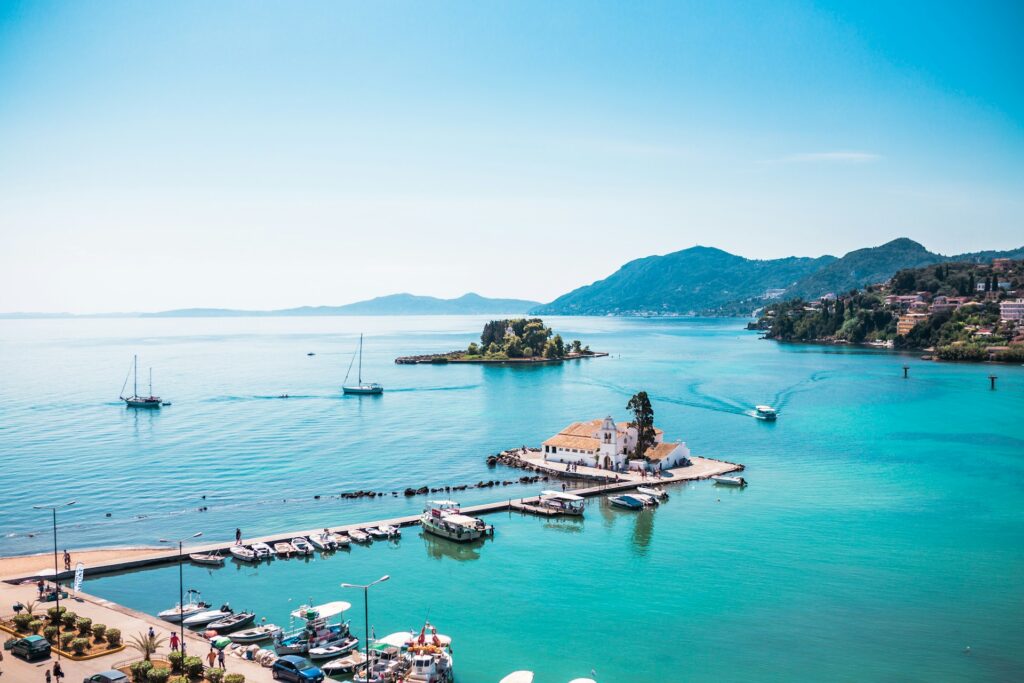
The Practical Stuff
Healthcare: For digital nomads in Greece, comprehensive health insurance is mandatory for obtaining the digital nomad visa and is crucial for accessing healthcare services during your stay. For those not immediately eligible for state healthcare, private health insurance becomes essential and is generally more affordable than UK private healthcare. If you’re going to be working and paying into the Greek social insurance system, you’ll get state healthcare on the same basis as a Greek citizen through EOPYY, the Greek National Organisation for Healthcare Services Provision.
Banking: You’ll need a Greek bank account for pretty much everything from paying rent and utility bills to everyday expenses. The process starts with getting your AFM, which is your Greek tax number (Arithmo Forologiko Mitro), and while it involves some paperwork, it’s straightforward once you know the steps. Digital nomads can open accounts with major Greek banks like Eurobank, which offers specific services for remote workers and expats, making the process smoother for those on digital nomad visas.
Buying Property: Properties for sale in Greece are generally much lower priced than UK equivalents, though popular areas like Santorini and Mykonos command premium prices. Many buyers find excellent value in traditional properties that need some renovation, particularly on islands like Crete and Lesvos.
If you’re considering purchasing rather than renting, contrary to popular belief, it’s possible to buy a home in Greece without a Golden Visa. Yes, you read that correctly. If you are from outside the EU and want to buy a home in Greece, you don’t need a Golden Visa. Indeed, there are other Visas besides the Golden Visa you get with property investment.
As Forbes writes “a Greek golden visa investment only makes sense in a handful of specific cases (if you’re from a country that does not enjoy visa-free travel to the EU or if you’re looking to gain residency without becoming a tax resident in Greece)”. They go onto explain that “if you’re interested in gaining residency in Greece, there are simpler, more affordable alternatives, such as the Financially Independent Persons Visa (a “self-sufficiency” visa) and the digital nomad visa”.
Money matters: You’ll need to declare any assets held outside Greece and file an annual declaration of assets alongside your annual tax return. There are severe penalties for failing to file or providing incorrect information, so professional tax advice is strongly recommended to navigate the complexities of dual-country obligations.
Cost of living comparisons: A three-course meal for two costs around £43 in Greece compared to £60 in the UK. A loaf of bread runs about £1.08 versus £1.22 back home, while a pint costs around £3.90 compared to £4.50 in Britain. Monthly public transport passes are approximately £26 versus £68 in the UK, and perhaps most significantly, rent for a one-bedroom city center apartment averages £433 compared to £1,059 in the UK.
The Bottom Line
Living year-round on a Greek island is genuinely one of Europe’s most attractive lifestyle choices for UK citizens. These four represent the cream of Greece’s year-round living destinations – islands large enough and economically diverse enough to support permanent residents, each offering distinct characters, climates, and communities to suit different lifestyles and budgets.
Yes, Brexit has added some paperwork, but the various visa routes mean committed folks can still make it happen. The combination of excellent weather, affordable living costs, rapidly improving internet infrastructure, and rich cultural heritage makes these islands serious alternatives to traditional retirement or remote work destinations.
The secret to success lies in thorough research, understanding the legal requirements, and picking an island that matches both your lifestyle dreams and practical needs. With proper planning, realistic expectations, and perhaps a bit of patience with Greek bureaucracy, that Mediterranean island life could be closer than you think.





